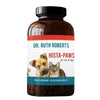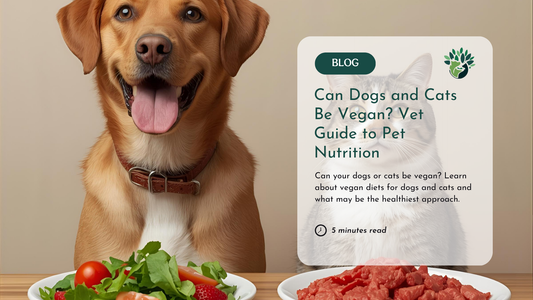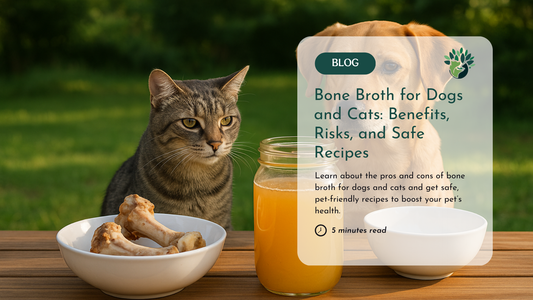For many pet parents, the idea of feeding their furry friend a vegan diet raises one big question: Is it healthy and safe? While cats and dogs share our homes, their nutritional needs are very different. Cats are obligate carnivores, they cannot survive without animal protein. Dogs, on the other hand, are more flexible omnivores. But does that mean they should be vegan? Let’s break down what science says.
Can Cats Be Vegan?
Cats are obligate carnivores, meaning they must consume certain nutrients normally found only in animal tissue:
-
Taurine – essential for heart and eye health
-
Arachidonic acid – supports skin and reproductive health
-
Vitamin A (preformed) – cats cannot convert beta-carotene into usable vitamin A
-
Arginine – vital for detoxifying ammonia through the urea cycle; cats cannot synthesize enough due to low activity of key intestinal enzymes (pyrroline-5-carboxylate synthase and ornithine amino-transferase) (Morris, J.G., Journal of Nutrition, 2002).
Without these, cats may develop life-threatening conditions such as dilated cardiomyopathy (DCM), blindness, immune dysfunction, or even hyperammonemia.
The New Evidence
A 2023 study (Knight et al.) surveyed over 1,300 cats fed either meat-based or vegan diets for at least one year. Key findings included:
-
Cats on vegan diets had fewer vet visits, less medication use, and lower odds of progressing to therapeutic diets.
-
Out of 22 health disorders tracked, 15 were more common in meat-fed cats, while 7 were more common in vegan-fed cats.
-
Only kidney disease was significantly higher in vegan cats, though this result was based on 4 cases.
While most differences weren’t statistically significant (likely due to the small sample of vegan-fed cats), the overall trend suggested that nutritionally complete vegan diets may support feline health as well as, or better than, traditional meat-based diets.
|
⚠️ Important Caveat: This research only followed cats for a relatively short timeframe compared to a cat’s 12–18 year lifespan. Long-term risks of a fully vegan diet (like subtle nutrient deficiencies, kidney strain, or metabolic issues) remain largely unknown. |
Can Dogs Be Vegan?
Dogs are omnivores, capable of digesting both plant and animal foods. Research suggests they can survive, and in some cases thrive, on plant-based diets if carefully balanced.
A 2022 peer-reviewed study in PLOS ONE compared over 2,500 dogs fed conventional, raw, and vegan diets. The findings were striking: dogs fed vegan diets had fewer vet visits and were reported as healthier overall compared to those on traditional meat-based kibble (Knight et al., 2022).
Another angle worth noting: vegan diets naturally restrict methionine, an amino acid that cancer cells rely on for growth. Studies in cancer biology suggest that limiting methionine intake may help slow cancer progression (Gao et al., Nature, 2019).
But Does That Mean All Dogs Should Be Vegan? Not Necessarily.
Here’s why:
-
Nutrient Gaps Still Exist – Certain amino acids (like taurine, lysine, and methionine) and vitamins (like B12 and D) are harder to source from plants alone. Without precise supplementation, deficiencies can occur.
-
Individual Needs Differ – Puppies, seniors, and dogs with health conditions (like kidney disease or digestive sensitivities) may not do well on vegan diets.
-
Digestive Load – Many vegan diets rely on legumes and grains, which can cause bloating or intolerances in some dogs.
-
Long-Term Unknowns – While short- and medium-term studies show promise, we lack robust 10–15 year lifespan studies to confirm vegan diets are optimal across a dog’s whole life.
|
Bottom line: Dogs can do well on vegan diets if they’re carefully formulated and supplemented, but it doesn’t mean they should be vegan by default. The safest approach may be a flexitarian diet, mostly plant-based with high-quality animal protein a few times per week, to balance health benefits with evolutionary needs. |
Takeaway: A Flexible Approach Works Best
When it comes to your pet’s diet, there isn’t a one-size-fits-all answer.
-
Cats are obligate carnivores. Can they survive on a vegan diet? Possibly. Will they thrive long-term? Probably not. Their biology makes certain animal-derived nutrients non-negotiable.
-
Dogs are omnivores, which gives them more flexibility. Some dogs can do well on carefully balanced vegan diets, while others may need animal protein to truly thrive.
The practical approach? Flexibility.
Incorporating more plant-based foods into your pet’s diet is a positive step, even adding a few “no meat days” each week can support health, sustainability, and variety without taking unnecessary risks.
Ultimately, the best diet is the one that’s nutritionally complete, balanced, and tailored to your pet’s unique needs, not just your own preferences.
Ready to Try a Balanced, Flexible Approach?
🍲 Explore The CrockPet Diet — an adjustable home-cooked recipe plan where you control ingredients and ensure complete nutrition.
💊 Pair it with Holistic Total Body Support Multivitamin for essential nutrients.
🌿 If your pet is allergic to beef or pork, check out Pet Daily Wellness — a gentle, plant-based option to help fill nutritional gaps safely.
With the right recipe and supplements, you can give your pet the best of both worlds: the benefits of fresh, plant-forward nutrition plus the essential nutrients they need to thrive.















